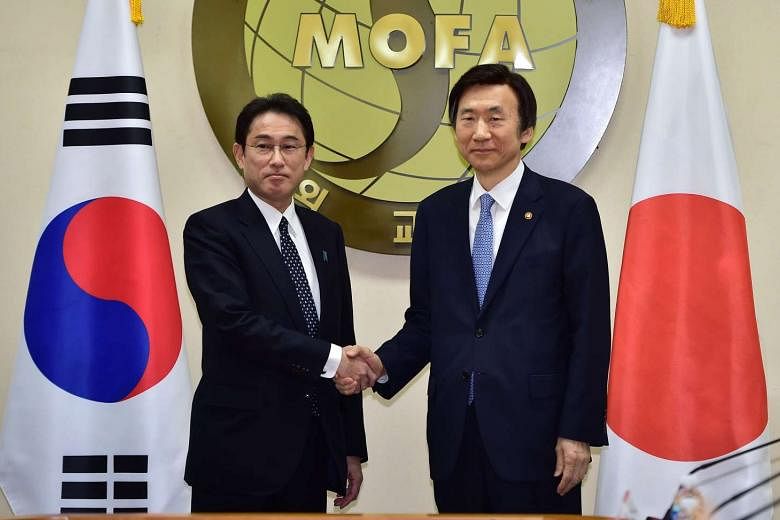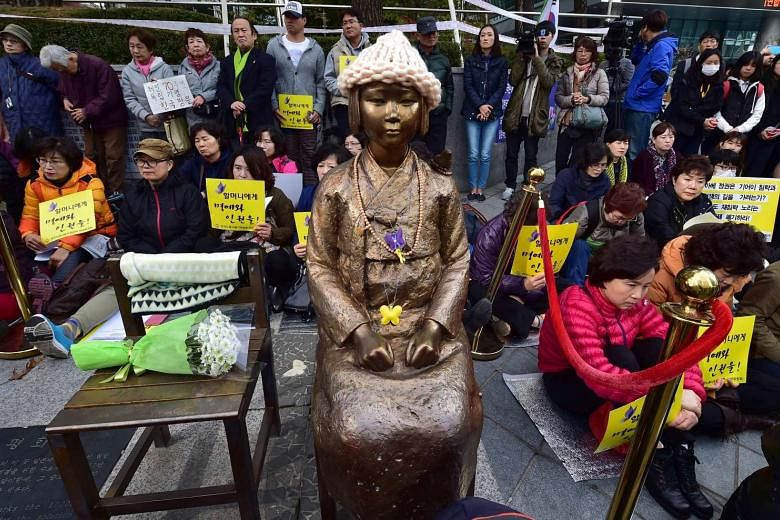SEOUL (AFP, BLOOMBERG, REUTERS) - South Korea and Japan have reached a landmark agreement Monday (Dec 28) on the thorny issue of wartime sex slaves that has long strained relations, with Japan offering millions in compensation.
The deal would be "final and irreversible" if Japan fulfills its responsibilities, South Korean Foreign Minister Yun Byung Se told reporters after talks with his Japanese counterpart Fumio Kishida.
The Japanese government feels "deep responsibility" over the issue of comfort women, as those who were forced to work in Japan's wartime brothels were euphemistically known, and will contribute to a fund to help the women, Japanese Foreign Minister Fumio Kishida told a news conference after the meeting.
"Prime Minister Abe, as the prime minister of Japan, once again expresses his feeling of heartfelt apology and remorse to all those who, as 'comfort women', experienced much suffering and incurred incurable psychological and physical wounds," Mr Kishida said.
Mr Kishida said Japan agreed to offer 1 billion yen (S$11.7 million) in state compensation for the "comfort women".
"The comfort women issue... occurred with the involvement of the Japanese military... and the Japanese government acutely feels its responsibility," he said.
"It is historic and epoch-making that such an agreement has been reached," Mr Kishida said, adding that Japan was "painfully aware" of its responsibilities in the issue.
"I believe this has set up a stage for advancement of security cooperation between Japan and South Korea, as well as among Japan, the United States and South Korea".
Mr Abe expresses an "apology and repentance from the bottom of his heart" to the victims, Mr Kishida added.
"I think the agreement we reached is historic and is a ground-breaking achievement," he said.
The deal, he said, "will not only benefit our country but also largely contribute to the region's peace and stability".
As part of the agreement Seoul will try to relocate a statue symbolising comfort women which currently stands in front of the Japanese embassy through consultations with relevant non-governmental organisations, Mr Yun said.
He said Seoul would also refrain from bringing up the comfort women issue again in international forums such as the United Nations.
"I am very pleased to declare the successful conclusion of the difficult negotiations before the year is out, the 50th anniversary of diplomatic ties," Mr Yun said.
Mr Abe and South Korean President Park Geun Hye also spoke by telephone on Monday after the conclusion of the deal.
Last month, South Korean President Park Geun Hye and Japanese Prime Minister Shinzo Abe held the first bilateral summit between the two countries in more than three years, agreeing to speed up negotiations on the comfort women issue and seek a resolution as soon as possible.
Disputes over Japan's imperial past have weighed on bilateral relations in recent years. While Mr Abe acknowledged the "immeasurable damage and suffering" inflicted by Japan in an August statement marking the 70th anniversary of the end of World War II, he said the nation should not be expected to keep apologising for the conflict.
Japan colonised the Korean peninsula from 1910 to 1945, a period still recalled with resentment among many Koreans. Historians say anywhere from 50,000 to 200,000 women - many of them Korean - served in Japan's military brothels.
Japan apologised in 1993 and set up a compensation fund that was rejected by some victims because it was privately funded.
South Koreans have continued to draw attention to the suffering of comfort women, erecting statues honouring them in the US as well as one in front of the Japanese Embassy in Seoul. Meanwhile, right-leaning Japanese politicians have tried to play down Japan's responsibility in exploiting the women.
Last year, Mr Abe blamed inaccurate reporting on the issue for damaging Japan's honour, remarks seen as a reference to a series of reports withdrawn by the Asahi newspaper that purportedly detailed Japan's trafficking of women before and during the war.



